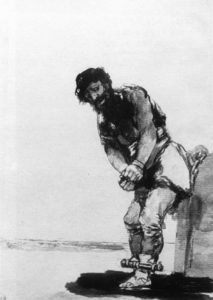Death can be confusing, and confounding. A friend’s brother died very suddenly a few weeks ago—he was sitting, then he was standing, then he was falling. Cardiac arrest. Another friend’s husband died six weeks after she brought him home from assisted care. Probably a stroke. My mother passed away almost 12 years ago, just shy of her 88th birthday, and the cause was never determined. At 88, her body didn’t need a cause. After the first fall she declined rapidly, not wanting to stick around and be a burden to her children, even though we were ready to be burdened. On the last evening, I put my head on her chest to pick up her heartbeat.

I heard the last one, faltering like a footstep seeking purchase. Then stillness.
Through medical science we know when our hearts begin to beat: not to the minute, but definitely to the week, perhaps even the day. But no one knows when his heart will stop—with perhaps one exception.
I think about that sometimes after an early morning run, when I’m winding down and my heart rate it up to a healthy 140. I can feel it in my chest and hear it in my ears and contemplate the many millions of times it has clenched and released. It’s been a steady, reliable little machine for seven decades now. How much longer?
“All the days ordained for me were written in your book before one of them came to be.” All the heartbeats, too, and every breath. If he keeps track of the hairs on my head, he must also have a number in mind: 2,575,440,000 . . . 2,575440,001 . . . 2,575,440, 002 . . . When my heart reaches that predetermined number, it will stop.
Once, in a dusty village called Nazareth, a girl who had never slept with a man felt a baby quicken in her womb. She had been warned it was going to happen, but maybe she hadn’t told anyone yet, waiting to see if the angel’s word would actually come true. Imagine the start, her hand on her belly, a quick breath, the news taking shape in her own body. But even before that the little form was growing, and at some time during the fifth or sixth week, his tiny heart began to beat.
Ke-thump, ke-thump, ke-thump. Quickly slipping into the stream of time.
The angels know. The Father knows. Now Mary knows, and her own heart keeps the little one company.
Ka-thump. Ka-thump. Ka-thump.
Did he know? Was his developing brain somehow aware that it had directed a heart to start pumping, and that it would keep pumping for thirty-three years before grinding to a halt, filling with water, spilling blood when pierced by a Roman spear?
If not then, he would know later. He would know, to the second, when the last drop of blood would fill up the measure and pay the price. His heart would stop once he willed it to stop, after pulling in a last breath and surrendering his spirit.
Then it would lie still in a cold body, wrapped up like a swaddled baby and carefully placed on a stone slab in a tomb. For the next 30-odd hours it would remain still. But then, sometime in the pre-dawn hours of the third day, it started beating again. And all these centuries later, it beats still. For us.

